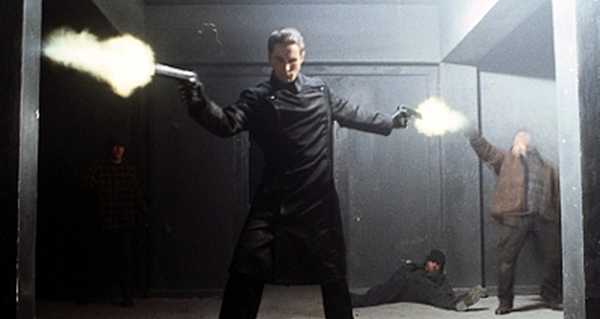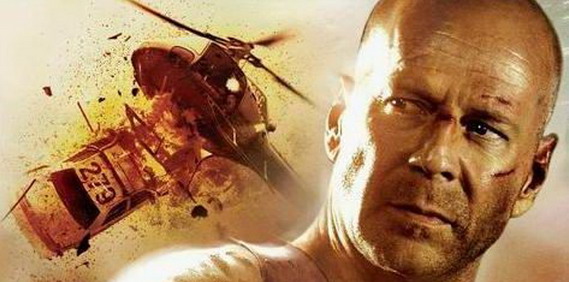Trending
Opinion: How will Project 2025 impact game developers?
The Heritage Foundation's manifesto for the possible next administration could do great harm to many, including large portions of the game development community.

Featured Blog | This community-written post highlights the best of what the game industry has to offer. Read more like it on the Game Developer Blogs or learn how to Submit Your Own Blog Post
We need to reject the glorification of violence in video games and other media.

This is a reprint of an article originally written for my site at keithburgun.net.
 I am very happy that we seem to be having a bit of a cultural awakening when it comes to the portrayal of women in video games. In general, the degree to which the "Bikini Warrior" character design is met with disgust is rising, and it will continue to rise in the coming years.
I am very happy that we seem to be having a bit of a cultural awakening when it comes to the portrayal of women in video games. In general, the degree to which the "Bikini Warrior" character design is met with disgust is rising, and it will continue to rise in the coming years.
I think while we continue to work on that, another frontier is the problem of violence glorification, something which plagues all of our media, but perhaps video games and movies worst of all.
This article is not about game design, and in fact, I will be using several examples from outside of games because I think these examples highlight the issue best, and the problem is culture-wide and not specific to interactive entertainment. This article does, however, address a common problem in the themes and settings of games and other media and how it affects the wider culture. In Part 2, I will address a separate problem with violence in games and how it negatively impacts game design.
I should say that I am strongly against the idea of any kind of censorship and am not advocating for that. Instead, I am hoping to convince others that a social and cultural change on this topic is in our best interests.
Actual violence is not cool. It's never glamorous, and it's never fun. If there exist situations wherein it becomes necessary, those situations are all tragedies - displays of weakness, and cowardice; a wasteful failure of humanity.
Until recently, I don't know if I completely internalized this fact. Don't get me wrong: I've always known that real-life violence was ugly, and I've always been vocally anti-violence. I've never been in a fight, and I recall feeling profoundly embarrassed for those involved when I'd see a fight break out in high school.
But there's a difference between thinking an idea and feeling it. You can consciously, intellectually know that violence is horrible and ugly, and at the same time subconsciously either "not mind" violence, or even relish it. In my case, I would say that I've had a bit of this dissonance for my entire life, and I don't think I'm alone.
There's always been this dissonance surrounding the topic. I don't like violence and I'm not a violent person, but being a male who's growing up in our society, I of course always liked action movies, video games, comic books, and all kinds of violence-heavy media.
The given explanation for this has always been that there's a strict dividing line between fantasy and reality, and so a completely non-violent person can enjoy violent media. On the face of it, this is true. Just as it's true that most people who play Bikini Warrior Game do not hold sexist views - in fact, many of them would probably describe themselves as feminists.
At the same time, though, all media, no matter what it is, communicates cultural values. The subtext of most action movie fight scenes is something like, "look at how great this character is for solving this problem by using violence", or "it's heroic to use violence", or sometimes just: "violence is glamorous/cool".

The dissonance is seen somewhat clearly with action films that are borderline satirical, such as Robocop, The Expendables, or the Rambo sequels. In these cases, the author is setting up an "excuse" for you to enjoy the violence. It's a bit like one of those websites that has a "Top 20 Most Offensive Skimpy Outfits from Videogames" article - they're actually cashing in on the thing they claim to be offended by.
I think the glorification of violence is something that people - particularly males - are taught to value. I don't think it's something we would otherwise naturally value. There may even be historical/evolutionary reasons why this Men Are Violent meme appeared in the first place. My guess is that glorification of violence was a useful tool to us throughout most of history, which took place in a vastly more violent world than the one we know today.
We've made a ton of progress on this front, and perhaps one difference between the status quo on violence and the status quo on sexism is that we've simply made more progress overall on the former. However, I would argue that even if we are doing fantastically on developing an anti-violent culture, we need to do even better. The stakes are just too high.
I recently watched the first couple episodes of The Walking Dead. I had been very hesitant to watch it, because I've been skeptical of the "zombie apocalypse" premise for reasons which weren't completely clear to me until recently. Regardless, it's such a cultural centerpiece these days that I figured I should at least check it out.
Watch the following clip, which compiles "kill shots" from the first few seasons. (NSFW)
Like any of the other ugliest parts of our culture, violence-glorification knows how to wear a disguise, but in this clip, the disguise is thin. When I was much younger, I would have said that it was legitimately cool. In my 20s, I might have said that it was "funny" or perhaps "dramatic". But now, this bothers me. I actually find it to be extremely distasteful, incorrect, stupid, and just straight up bad writing.
The reason that the "zombie apocalypse" setting is so offensive to me is that it's the author manufacturing a scenario under which violence could be not only justifiable, but so clearly justifiable that we can even glorify it. It's going to great lengths to manufacture such a scenario. In other words, the starting point is "I want to portray violence". From there, we come up with a rationalization - some bizarre, weird scenario under which horrendous violence is our only option. "Uh... well, what if every human in the world got taken over by some curse which made them just want to rip me apart alive!? THEN could I shoot them point blank in the face with a shotgun with a grin on my face?"
The "superhero" and "lone badass action hero" tropes are also great examples of this. You have a guy - and it's almost always a guy - who has to, for whatever reason, gun down dozens of faceless, nameless "thugs" who "have it coming". Sylvester Stallone, Bruce Willis, Arnold Schwarzenegger and a few others quickly come to mind as people who embody this trope, and who tend to embody the concept of manliness for generations of little boys.

The portrayal of our hero just wantonly killing nearby "thugs" might even be getting worse. "Thugs" have to have done less and less to deserve being murdered in films and video games. Early on, they had to at least shoot at our hero, or threaten him somehow. Now, they just have to be associated with some "bad" organization and be standing around at HQ, and this merits their death. This appears even in more "comic" movies one might consider benign, like the recent Guardians of the Galaxy.
A counter-argument I've heard is that actually, the primary values of these movies and games are about "good defeating evil". My counter to that counter-argument is: "good defeating evil" is just another way of phrasing the same problem. In both cases, the problem is reducing human beings to "objects that need killing".
Here's another example, this time from Far Cry 4 (Should probably be NSFW, but disturbingly, I kinda think it might actually be SFW...)
I think we've gotten a bit de-sensitized to what it is we're looking at with things like this. The above is, among other things, a human killing simulator. They're bad guys though, don't worry.
A writer could write about a billion different things, but the fact that they are choosing to create a scenario wherein violence is so obviously the only reasonable choice reveals a lot about their values.
I am not saying "never portray violence in media". Violence is horrible, but to pretend that it doesn't exist is also absurd. When we portray violence, we should portray it as it really is: ugly. Weak. Disgusting. Not disgusting as in "blood-and-guts yucky" disgusting, but disgusting as in the feeling you get when you read public rape threats, hear a KKK leader speak, or accidentally scroll down to the comment section on a YouTube video.
My favorite work of fiction is Breaking Bad, which portrays violence often. However, most of the violence in the show is portrayed in an extremely negative light, particularly when our main characters commit the acts. It's almost never supposed to be cool(the one possible exception being the Mexican brothers in Season 3, which is probably the worst part of the show).
(Spoilers ahead, so skip to the next paragraph if you haven't watched Breaking Bad yet and (erroneously) believe in spoilers.) That first scene, with Crazy-Eight and the pipe, is a depiction of violence that I really like. Between a tear gliding down his face as he begins the struggle, and the repeated whispering of "I'm sorry" after the act is done, Walter's tremendous sense of remorse for having done this is thoroughly apparent. Not to mention the episode-long struggle that Walter experienced trying to find some way of avoiding having to do this. What has just happened is not remotely cool, and that is a value that I strongly agree with.
By the way: that video has a kill counter on it. Let's take a moment and imagine if there was something else just as horrible with a "counter". Perhaps if there's some crime show that has more than one rape scene, we could have compilation video with a "rape counter"? Does that seem tasteful? While there might be small disagreements, I think for the most part we'd generally agree that killing is at least roughly as horrible as raping (here's a good lengthy discussion on that topic).
Breaking Bad's portrayal of violence actually advances our society; it does the opposite of what glorified violence does. Violence is bad, so portraying it as such is illuminating. Portraying it as glorious is regressive.
Experiencing works that glorify violence allow you to flex your Anti-Compassion muscles. Humans are naturally compassionate for one another; we really have to learn to drop that compassion and see our enemy as "other" in order to actually want to kill them.
Now, I think I could play violent video games for eight hours a day, every day, and never hurt a fly for as long as I live. In fact, I sort of did that for about half of my years on this planet. I'm not convinced that there is a direct connection between experiencing violent media and being a violent person (although I should mention that there exists a good amount of research on this subject suggesting that there is such a connection).
What I do think is that there is a direct connection between one's cultural values and being a violent person, and films, games, music and everything else absolutely is a part of what builds our cultural values.
These cultural values then go on to not only influence us on a personal level, but also are likely to influence us politically. Was it morally correct to assassinate Osama Bin Laden? I don't know - partially because we never even really had the conversation. Most people just accepted that of course it was correct, he's a freakin' BAD GUY!
There are times when we're faced with a question about whether we should go to war with some country. The anti-compassion muscles that let us see the bad guy as "other" in Guardians of the Galaxy are the same ones that we flex when we say, "just go in there and bomb the hell out of them!"
Obviously, the world is not full of good guys and bad guys. Even the bad guys of the day, ISIS, are certainly not all deserving of a gruesome murder, right? There are women, children, and probably a bunch of dudes who just don't want to cause trouble that are technically members or affiliates of ISIS (certainly all of them would be "justifiably" murdered by a marauding Bruce Willis). It's so easy to just say we should completely wipe them out. Part of what makes this so easy, I think, is that we're used to flexing our Anti-Compassion muscles.
I personally advocate for the abolition of the death penalty, and I've had a number of debates with people who are in favor of it. Inevitably, the conversation leads down a path that leads to some super-extreme scenario that would either literally never happen, or is so incredibly rare as to be useless when discussing policy. Hypotheticals such as the following appear in our conversation:
"Okay, well... what if you have a guy, and he like, raped and murdered like five little girls, and we KNOW with 100% certainty that he did it, and he admits it, and he's not sorry at all."
You see how there's this strange effort to try and find a situation wherein killing might be acceptable. There's some part of our culture that is looking for something to kill.
Really, though, we should expect that - especially from males. Boys are given two distinct messages as they grow up. They are verbally instructed, of course, to never be violent. However, media sends the message that yeah but actually you know that when it comes down to it, you gotta be a man and fucking KILL THE SHIT out of some bad guys. It sounds silly, but I really think that's the messaging we get.
By the way: men are significantly more likely to support the death penalty than women are.
Progress means fine-tuning our moral compass. Part of doing that means being more critical of the messages and values being put forward in the media we intake. It's not enough to write off violence glorification as just a meaningless skin on top of a "fun thrill ride". We need to reject these kinds of works and demand that creators come up to our moral level. It may be uncomfortable, but change always is.
Part 2 of this article will discuss how violence as a theme/setting negatively affects game design.
Read more about:
Featured BlogsYou May Also Like